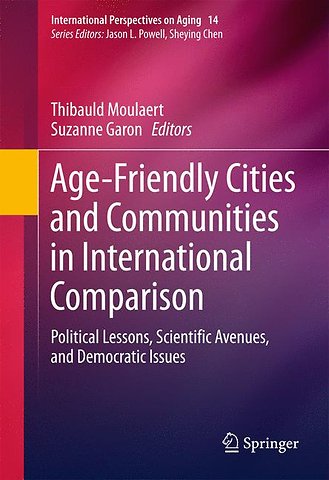Age-Friendly Cities and Communities in International Comparison
Political Lessons, Scientific Avenues, and Democratic Issues
Samenvatting
The supportive
role of urban spaces in active aging is explored on a world scale in this
unique resource, using the WHO’s Age-Friendly Cities and Community model. Case
studies from the U.S., Canada, Australia, Hong Kong, and elsewhere demonstrate
how the model translates to fit diverse social, political, and economic realities
across cultures and continents, ways age-friendly programs promote senior
empowerment, and how their value can be effectively assessed. Age-friendly
criteria for communities are defined and critiqued while extensive empirical
data describe challenges as they affect elders globally and how environmental
support can help meet them. These chapters offer age-friendly cities as a
corrective to the overemphasis on the medical aspects of elders’ lives, and should
inspire new research, practice, and public policy.
Included in the
coverage:
-A critical review of
the WHO Age-Friendly Cities Methodology and its implementation.
-Seniors’ perspectives on age-friendly
communities.
-The implementation of
age-friendly cities in three districts of Argentina.
-Age-friendly New York City: a case study.
-Toward an age-friendly European Union.
-Age-friendliness, childhood, and dementia:
toward generationally intelligent environments.
With its balance
of attention to universal and culture-specific concerns, Age-Friendly Cities and Communities in International Comparison
will be of particular interest to sociologists, gerontologists, and policymakers.
“Given the rapid adoption of
the age-friendly perspective, following its development by the World Health
Organization, the critical assessment offered in this volume is especially
welcome”.
Professor Chris
Phillipson, University of Manchester
Specificaties
Inhoudsopgave
Aging. – Population aging from a global and theoretical perspective. – Active Aging and Age-Friendly Cities: One
Model, Many Programs. – From the origins of AFC to the WHO global network. –
Quebec: from research to policy from 7 pilot projects to 579 cities. – Sao Paulo:
one action, three levels—state, city, and neighborhoods. – Hong Kong: the
centrality of participation. – Australia: proof of the “top-down” mistake. –
France: is AFC brand new for French cities? Belgium/Wallonia: the limits of the
WHO AFC model. – Waterloo, Ontario: AFC in action. – United States: when AFC is
developed further. – Manchester: is an urban perspective a means or an end? Challenges from and for Age-Friendly
Cities. – Respecting the older subject: building AFC toward recognition. –
The AFC model: between political economy and humanistic gerontology. – When AFC
meets policy. – Good and bad points about AFC. Conclusion
Anderen die dit boek kochten, kochten ook
Net verschenen
Rubrieken
- aanbestedingsrecht
- aansprakelijkheids- en verzekeringsrecht
- accountancy
- algemeen juridisch
- arbeidsrecht
- bank- en effectenrecht
- bestuursrecht
- bouwrecht
- burgerlijk recht en procesrecht
- europees-internationaal recht
- fiscaal recht
- gezondheidsrecht
- insolventierecht
- intellectuele eigendom en ict-recht
- management
- mens en maatschappij
- milieu- en omgevingsrecht
- notarieel recht
- ondernemingsrecht
- pensioenrecht
- personen- en familierecht
- sociale zekerheidsrecht
- staatsrecht
- strafrecht en criminologie
- vastgoed- en huurrecht
- vreemdelingenrecht







